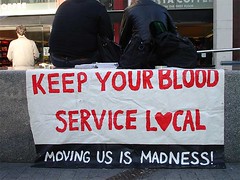What are the plans - and why are they a threat?
Staff have been in industrial dispute with the NBS board of directors/management for many months now, over an unworkable reconfiguration strategy. It is proposed that all local processing and testing labs be closed, and their functions condensed into just three 'supercentres' to serve the whole of England and North Wales, in Bristol, Manchester and Colindale.
The rationale for this plan is a short-sighted financial one. The strategy was boasted about in the Financial Times before it was even announced to affected staff. Directors are justifying centralisation because the demand from hospitals for red cells is currently falling, while the cost of each pack of red cells is rising. It suits them to assume this projected decline in demand will continue, despite an aging UK population and looming threats such as a flu pandemic. Other service areas that we provide, like platelets and transplants, are growing, but this seems to be ignored to fit with the market-minded strategy.
A study for respected journal Vox Sanguinis by Dr. A Pereira found that larger blood processing and testing centres do not necessarily lead to economies of scale.
Link here - registration needed for full text, but overview available to all.
We say that patients' welfare should be our number one concern, not tightening the purse strings to win praise from the Department of Health.
The National Blood Service is in fact a financially successful and efficient part of the NHS, which, unlike many health Trusts, is not in debt. The management proposals are purely based on cost-cutting and speculation by accountants. Our bosses have no problem with spending undisclosed thousands of taxpayers' money on parasitic external consultancy agencies.
The NBS directors plan to make overall 600 staff - half of the laboratory workforce - redundant. They claim this will save the service millions. (Surprisingly, just before the strategy was announced, around 50 new high level Band 7 posts were created, which cost the NBS £1.9 million in salaries.) These are highly specialised and skilled staff, many of whom have worked for the NBS for decades, and have never worked anywhere else. Opportunities for transfer to the new supercentres or suitable redeployment elsewhere in the crisis-stricken NHS are few and far between.
The new supercentres will be huge factories running on harsh anti-social 24 hour shift rotas to cope with the workload. At each site the NBS will have to wastefully recruit and train new workers, having just thrown the existing loyal workforce onto the scrapheap.
There are fears about road congestion delaying the smooth flow of products around the country. Our ability to respond in case of major incident could be compromised. There will be no south-east centre outside the M25, no centre at all north of London to the east of the Pennines, and no centre for the West Midlands (including the diverse needs of the second city, Birmingham). Police figures back up staff concerns about jams on long south-west transport routes. Blood collections from local mobile sessions and permanent donor centres would have to be driven hundreds of miles around the country to and from the supercentres, putting even more reliance on an already overloaded and frequently clogged up motorway network, and shortening the life-span of the products. The same would apply for patients' samples, increasing the risk of them being misplaced, wrongly stored or wrongly labelled.
Although the NBS vehicle fleet has been commended for its use of green fuel, adding to traffic volume is bad for the environment. Consider the effects of a major road traffic accident. There will be people needing blood which cannot be delivered because of the traffic chaos caused by the same accident. The suggestion of transporting blood by helicopter in an emergency is ludicrous - they have to be crewed and maintained which would be an impossible cost.
The official line is that services which need to be close to hospitals will stay there, like the issue blood banks. Staff believe otherwise. A patient died this week waiting to be rushed a 'washed' platelet from the local centre. 'Washing' is just one of many special processes done by the components lab - which is being centralised. 40% of samples crossmatched by our special investigations department (on-call day and night, 365 days a year) are classed as 'emergency'.
Staff do not believe that centralisation will make the Blood Service more efficient. We know best, not managers, the day-to-day and hour-to-hour needs of our hospitals and patients. We have good working relationships with our users, and essential local knowledge. Hospitals could be forced to spend more on training their own haematology staff, larger storage capacity and reagents for their own testing.
Despite what the directors say, neither employees or service users have had any meaningful input into the strategy - the service's future is being dictated to us all from on high.

For more information you can contact iww.nbs[AT]googlemail.com (replace [AT] with @)
Labels: FAQ, management strategy


0 Comments:
Post a Comment
Subscribe to Post Comments [Atom]
<< Home